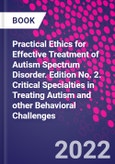Practical Ethics for Effective Treatment of Autism Spectrum Disorder, Second Edition is for behavior analysts working directly with, or supervising those who work with, individuals with autism. The book addresses the principles and values that underlie the Behavior Analyst Certification Board's� Professional and Ethical Compliance Code for Behavior Analysts and factors that affect ethical decision-making. In addition, the book addresses critical and under-discussed topics, including scope of competence, evidence-based practice in behavior analysis, how to collaborate with professionals within and outside one's discipline, and how to design systems of ethical supervision and training customized to unique treatment settings.
Across many of the topics, the authors also discuss errors students and professionals may make during analyses of ethical dilemmas and misapplications of ethical codes within their practice. New to this revision are chapters on Quality Control in ABA Service Delivery, Ethical Issues in ABA Business Management and Standardizing Decision-making in ABA Service Delivery.
Please Note: This is an On Demand product, delivery may take up to 11 working days after payment has been received.
Table of Contents
- Introduction to Applied Behavior Analysis, Ethics, and Core Ethical Principles
- Contextual Factors that Influence Ethical Decision-Making
- Creating Behavioral Systems to Support Ethical Behavior in Autism Treatment
- Identifying Your Scope of Competence in Autism Treatment
- The Decision-Making Process of Evidence-Based Practice
- Interdisciplinary Collaboration
- Standardizing Decision-making
- Quality Measurement in Applied Behavior Analysis
- Common Errors and Mistakes Made During Ethical Analyses and Application








